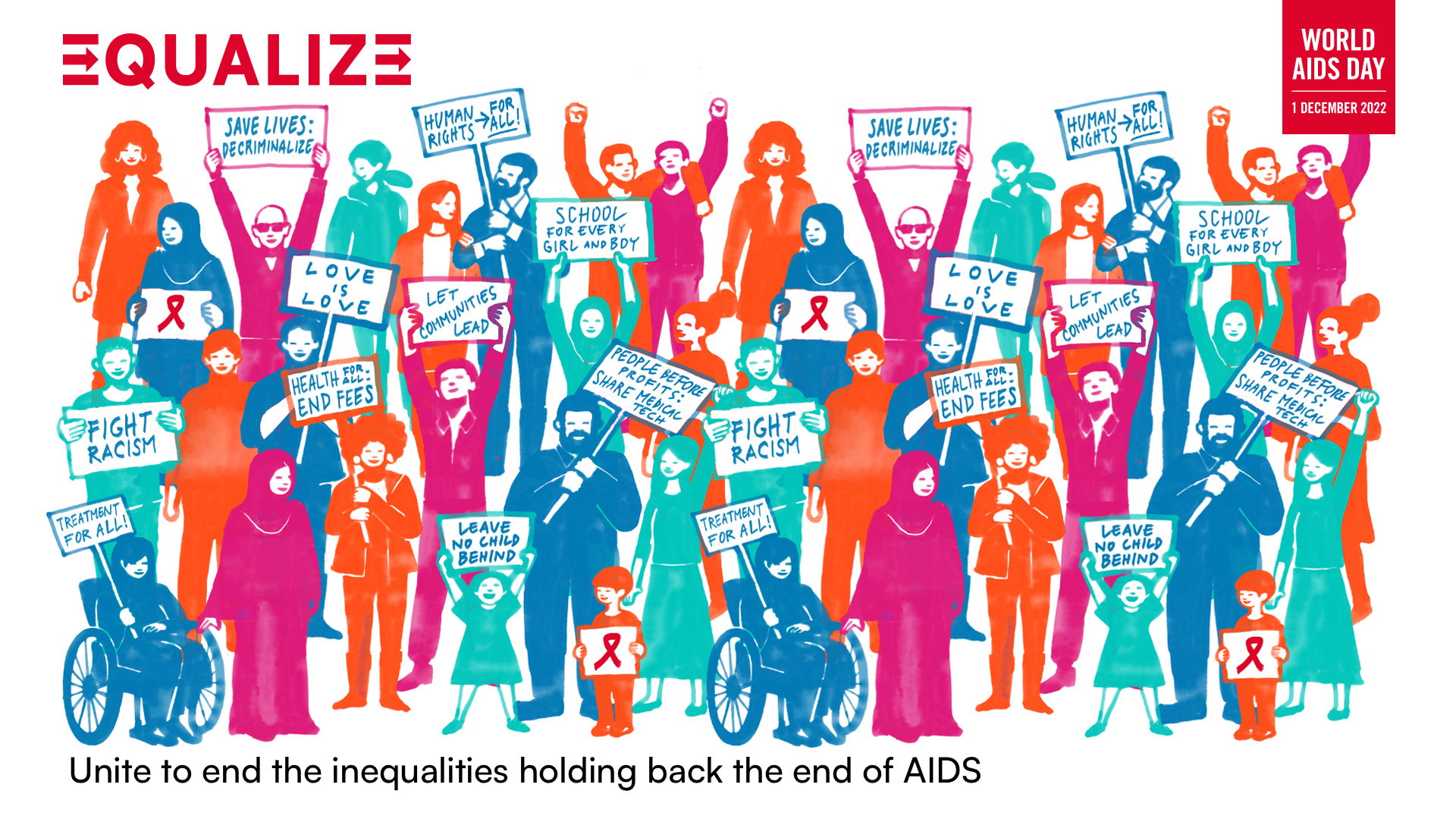
This year’s World AIDS day theme, ‘Equalise’, reminds us that to move forward on our HIV goals, we need to tackle the economic, social and cultural factors that perpetuate the HIV epidemic. These include poverty, gender inequality, various forms of discrimination, and uneven access to healthcare. The HSRC is working with communities to find solutions. By Andrea Teagle.
In South Africa, 94% of people living with HIV (PLHIV) know their status, according to UNAIDS data for 2021. By 2030, South Africa aims to achieve the UN 95-95-95: having 95% of PLHIV know their status; 95% of those on treatment; and 95% of those on treatment also virally suppressed (meaning that the amount of HIV in their blood is so low that it is undetectable). According to UNAIDS, South Africa is currently at 94-74-67. This means that, in total, only 46% of PLHIV in South Africa are virally suppressed.
In addition to getting and keeping more people on treatment, research suggests that managing the epidemic will require targeted HIV prevention measures. According to the HSRC’s 2017 national HIV survey (SABSSM V), population groups that face higher HIV risk in South Africa include young women, people with disabilities, drug users, transgender individuals, and couples who live together.
One way of reaching those who experience more barriers to HIV treatment and prevention services is through community-led healthcare, such as that provided by the Ikusas’elihle Clinic in the semi-rural Sweetwaters locality, just outside Pietermaritzburg, KwaZulu-Natal. The HSRC has been conducting research around solving social problems in and with this community since 2004. Recognising the ways that HIV and TB intersect with other social challenges like poverty and unemployment, the HSRC launched the clinic in April 2022, in partnership with the Bill and Melinda Gates Foundation and the University of Washington.
Ikusas’elihle clinic takes a holistic approach to HIV prevention. Here, researchers and clinicians explore new HIV technologies – such as drug regimens with fewer side effects – but they also look at ways of addressing barriers that undermine the effectiveness of interventions, like stigma or long waiting times at clinics.
Preventative measures
Young girls and women in Africa experience among the highest rates of new HIV infections. Pre-exposure prophylaxis (PrEP) is a preventative treatment, usually taken orally once a day, that the World Health Organization recommends for individuals with a substantial risk of contracting HIV.
One of the research projects taking place at the Ikusas’elihle clinic is the local arm of the INSIGHT clinical trial, a study to evaluate daily oral PrEP uptake, adherence, persistence, and preferences among young women in several African countries.
Dr Ziphozenkozi Nzimande is a research clinician involved in INSIGHT at the clinic. “Most of the women invited to participate have opted to take PrEP,” she says. However, the study has also revealed that most of the women struggle to take the medication on a daily basis. Another study at the clinic is trialling a different kind of PrEP medication that is taken once-monthly, to see if this makes it easier for women not to miss treatments.
Another issue that affects young women’s adherence to PrEP is stigma, Nzimande says. “They’re afraid that their family members, or people in the community will see, and think it’s an HIV drug. Or even if they find out its PrEP, [the women] might feel like they’re being judged, that [people will think] they’re being promiscuous.” She and her colleagues hope that re-packaging the medication in lip balm containers will help to make adherence easier. Women are also offered counselling and contraceptives at the clinic as part of an integrated service, she says.
Ensuring that young people all across South Africa have access to youth-friendly reproductive healthcare facilities is critical to reduce new infections among this age group. Providing appropriate training to healthcare providers is one way of addressing healthcare stigma experienced by young people and by minority groups like LGBTI individuals and sex workers.
Getting to the heart of HIV stigma
Research has shown that internal stigma reduces the chances that people remain on treatment. In the 2020-2021 Stigma Index study, led by the HSRC’s Dr Allanise Cloete, internalised stigma was revealed to be the most widespread form of HIV-related stigma in South Africa. In the study, half (49.7%) of participants endorsed measures of internalised stigma, which included statements such as ‘It is difficult to tell people that I am HIV positive’, and ‘I feel guilty that I am HIV positive’.
In November 2022, the HSRC held a workshop to finalise evidence to inform an action toolkit for tackling HIV-related stigma. Participants included PLHIV, HSRC researchers, the South African National AIDS Council, and representatives of the sex worker and transgender communities. The tool is the first of its kind to provide evidence-based guidelines for addressing stigma, Cloete explains.
“There are toolkits out there that address stigma, but they’re seen as quite abstract,” she says. The Getting to the Heart of Stigma toolkit is designed to be a practical resource, informed by people’s lived experiences. For instance, it includes suggested activities for talking about and addressing internalised stigma. “That’s why human rights groups were excited. We’re using their experiences and what they know works to inform the toolkit.”
By partnering with communities and key populations – and continuing its work of monitoring HIV prevalence and incidence across the country – the HSRC is committed to finding solutions to the underlying factors that drive the epidemic. As UNAIDS Executive Director Winnie Byanyima says, “We can end AIDS – if we end the inequalities which perpetuate it.”
Researcher contacts:
Stigma toolkit:
Allanise Cloete, a chief research specialist in the HSRC’s Human and Social Capabilities research division
acloete@hsrc.ac.za
Sweetwaters:
Researcher: Alastair van Heerden, a research director in the HSRC’s Human and Social Capabilities research division
avanheerden@hsrc.ac.za

